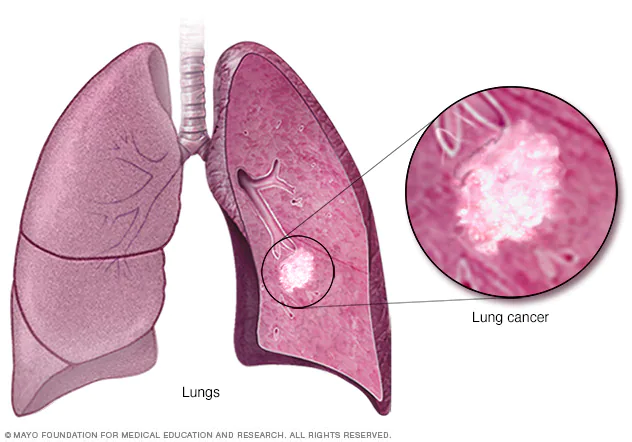Medical expert frowns at low reporting of lung cancer in Nigeria, sub-Saharan Africa
The burden of lung cancer is huge and grossly underreported in Nigeria and sub-Saharan Africa, a medical expert, Prof. Kelechi Okonta, has said. Prof. Okonta who is a consultant Cardiothoracic surgeon, and public health expert at the University of Port Harcourt Teaching Hospital, Rivers State, Nigeria, said to this end, many people are suffering from […]

The burden of lung cancer is huge and grossly underreported in Nigeria and sub-Saharan Africa, a medical expert, Prof. Kelechi Okonta, has said.
Prof. Okonta who is a consultant Cardiothoracic surgeon, and public health expert at the University of Port Harcourt Teaching Hospital, Rivers State, Nigeria, said to this end, many people are suffering from lung cancer and hardly know because of lack of awareness and proper diagnosis.
He disclosed this while delivering a lecture titled “Epidemiological Molecular Characteristics and Challenges with the Management of Lung Cancer: An Inquisitive Look at Nigeria and Sub-Saharan Africa” at the Princess Margaret Cancer centre, Prosserman Centre for Health Research, Mount Sinai Hospital at the University of Toronto, Canada.
He was the first African to be invited and given such a privilege by the institution to deliver a lecture on lung cancer. Thus clearly identifying Prof. Okonta’s expertise in the area of lung cancer research in the world.
- FG plans productivity-based wage system for workers
- Girl child education key to transforming African societies – Tinubu
The lecture was monitored in Awka, Anambra State, Nigeria, by our reporter via Zoom.
Prof. Okonta said poor reportage of lung cancer in Nigeria and sub-Saharan Africa poses a serious challenge to the health system of the region.
He said lung cancer in Nigeria and sub-Saharan Africa is being underreported because of poor and lack of data and inaccurate recording in the system.
He said the lack of a lung cancer registry in Nigeria poses a big problem in creating lung cancer awareness in the country.
Prof. Okonta, who is also the Head of the Department of Surgery, University of Port-Harcourt Teaching Hospital, Choba, Rivers State, said lung cancer risk is higher in Human Immunodeficiency Virus (HIV) infected populations than in general populations, and it is most common in non -acquired immunodeficiency syndrome deficiency malignancy and poor diagnostic facilities.
He also stated that lung cancer has a consistent association with cigarette smoking but noted that most of the patients with lung cancer in our environment are non-smokers, giving credence to the fact that other carcinogens possible from the inhalation of petroleum products may be implicated.
He added that polycyclic aromatic hydrocarbon compounds present in tobacco and petroleum products cause lung cancer.
“Various chemical products in refineries can cause cancer following prolonged exposure to some of the emitted carcinogens.”
He further said that increased refinery activities, urban dwellers’ pollution, and occupational and environmental activities increase the risk of lung cancer in Nigeria and sub-Saharan Africa.
The challenges of lung cancer care in Nigeria
Prof. Okonta identified the challenges as follows:
-Gross resource limitations, poor general awareness of the enormity of the disease burden, and the currently available resources for diagnosis and care.
-Negative impact of cigarette smoking and the lack of a centrally coordinated structure population base lung cancer registry with full proof database.
-Lack of centrally coordinated, well-designed actionable, and evidence-based national lung cancer control plan. Persistently cumbersome referral system within the overall national healthcare system.
-Lack of clear national lung cancer screening strategy or programme, and lack of locally relevant policies, guidelines, treatment algorithms, and care pathways, especially for early disease detection, and uncommon implementation of multi-disciplinary team (MDT) to provide comprehensive care.
Way out
He said addressing the lack of expertise, circular migration of skilled physicians should be encouraged, and also the technological gap and challenges in practices should be encouraged.
He said there should be an emphasis on skills development in diagnostics, adding, “The country needs to solve the problem of underdiagnosis, and the problem of healthcare funding. “
He also called for a minimally invasive method of obtaining a biopsy of lung cancer and subjecting the sample to molecular testing to identify targetable drive mutation and create lung cancer website awareness information and collations of data.
“Newer target therapies, as well as advancements in the genetic blueprint, collaboration – exchange knowledge and peer review collaboration in research, should be encouraged,” he added.
Okonta also advocated for the use of molecular profiling in the management of patients to improve their survival.
He added that the ultimate aim of the meeting is to build collaboration with the Princess Margaret Cancer Centre Toronto in the area of lung cancer research and treatment, starting from Nigeria and sub-Saharan Africa.
The host, Prof. Geoffrey Liu, in his opening statement stated how Prof. Okonta was selected all the way from Pretoria, South Africa, following his extensive publications in the area of lung cancer. He further stated that he was looking forward to collaborating with Prof. Okonta and their institution in the area of lung cancer.
